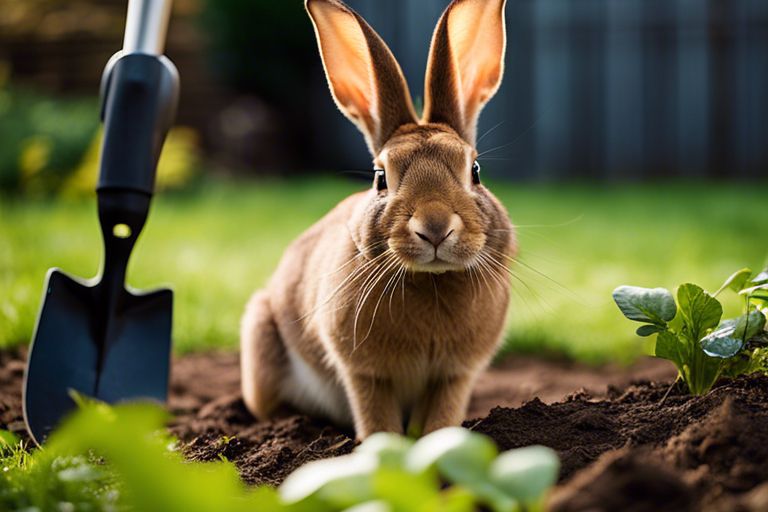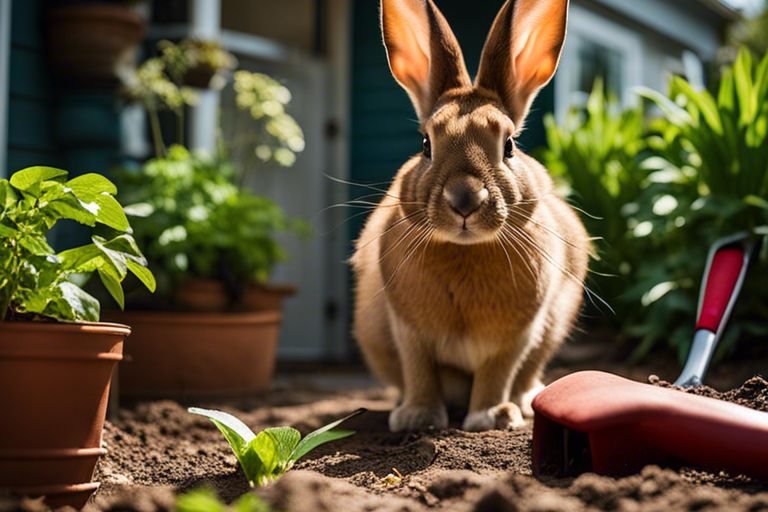Did you know that Flemish Giants are famous for their impressive digging abilities? This behavior can be potentially dangerous for your yard and garden, but it also serves an important purpose for these large rabbits. Understanding their digging tendencies can help you create a suitable environment for them and prevent any damage to your property. In this post, we will explore the digging behaviors of Flemish Giants and provide you with essential tips to manage this characteristic.
Key Takeaways:
- Flemish Giants are known for their digging behaviors.
- This behavior is natural for Flemish Giants as they are burrowers in the wild.
- Providing a suitable digging area such as a sandbox or designated space can prevent destructive digging.
- Regular exercise and stimulation can also help reduce digging behaviors in Flemish Giants.
- It’s important for Flemish Giant owners to understand and accommodate for their natural instincts to dig.

Flemish Giant Characteristics
Now, let’s delve into the characteristics that make the Flemish Giant rabbit breed so unique. From their impressive size and strength to their gentle temperament, there is much to discover about these remarkable creatures.
Size and Strength
The Flemish Giant is known for its large size and powerful build. They can weigh up to 14 pounds or more, making them one of the largest domestic rabbit breeds. Their strong, muscular bodies give them an imposing presence, and they require plenty of space to move around comfortably.
Temperament and Socialization
When it comes to temperament, the Flemish Giant is known for its gentle and docile nature. They are friendly, affectionate, and enjoy human companionship. Proper socialization from a young age can help them become even more outgoing and comfortable around people and other pets.
Child- and Pet-Friendliness
If you have children or other pets in your household, you’ll be glad to know that Flemish Giants are typically great with both. Their calm demeanor and large size make them well-suited for interacting with kids, and they can also get along well with other animals when properly introduced and supervised.
Energy Levels and Exercise Requirements
Despite their size, Flemish Giants are not particularly high-energy animals. They are content to lounge and relax for much of the day, but they still benefit from regular exercise and mental stimulation. Providing ample space for them to move around and play is essential for keeping them healthy and happy.
By now, you’ve learned more about the distinctive characteristics of Flemish Giants, including their size, temperament, and compatibility with children and other pets. But what do these traits mean for their digging behaviors? Let’s explore that further in the next section.
Behavior Analysis
Lastly, let’s delve into the behavior analysis of Flemish Giants to understand their digging instincts and how they compare to other rabbit breeds.
Digging Instincts in Flemish Giants
Flemish Giants are known for their strong digging instincts, which can be attributed to their ancestry as burrow-dwelling animals. This behavior is a natural instinct for them and serves various purposes, including nesting, hiding, and exploring their environment.
Factors Influencing Digging Behaviors
Several factors can influence the digging behaviors of Flemish Giants, including environmental stimuli, breed genetics, and individual personalities. Environmental stimuli such as the availability of digging materials, such as hay or bedding, can significantly impact their digging behaviors. Breed genetics also play a role, as Flemish Giants are bred for their strong digging instincts. Individual personalities can vary, with some rabbits showing a strong inclination to dig while others may not exhibit this behavior as prominently. After all, understanding the factors that influence their digging behaviors can help you create an environment that encourages their natural instincts while also providing appropriate outlets for this behavior.
Comparison with Other Rabbit Breeds
When compared to other rabbit breeds, Flemish Giants stand out for their exceptionally strong digging instincts and their larger size, which can result in more extensive digging activities. Additionally, their docile nature makes them more inclined to dig without causing harm, compared to more aggressive breeds. You can find a comparison of the digging behaviors of Flemish Giants with other rabbit breeds in the table below:
| Trait | Flemish Giants |
|—————-|———————————–|
| Digging Instincts | Exceptionally strong |
| Size | Larger |
| Nature | Docile |
Managing Flemish Giant Behaviors
To ensure that your Flemish Giant exhibits positive behaviors, it is important to manage their natural instincts and tendencies. By providing proper housing, enrichment, obedience training, and healthcare, you can help your pet rabbit thrive in your home environment.
Proper Housing and Enrichment
When it comes to managing your Flemish Giant’s behaviors, providing the right housing and enrichment is essential. Make sure your rabbit has a spacious, well-ventilated enclosure that allows for plenty of movement. Additionally, provide toys, tunnels, and hiding spots to keep your rabbit mentally and physically stimulated. This will help prevent boredom and reduce the likelihood of destructive digging behaviors.
Obedience Training and Positive Reinforcement
Training your Flemish Giant using positive reinforcement techniques can help shape their behaviors in a positive way. By using treats and praise, you can encourage your rabbit to exhibit desirable behaviors while discouraging unwanted ones. Obedience training can also help strengthen the bond between you and your rabbit, leading to a happier and more well-behaved pet.
Healthcare: Check-ups, Vaccinations, and Parasite Prevention
Regular veterinary check-ups, vaccinations, and parasite prevention are essential components of managing your Flemish Giant’s behaviors. Poor health can lead to stress and discomfort, which may manifest in negative behaviors such as digging and chewing. By keeping your rabbit healthy and free of parasites, you can ensure that they are able to exhibit their best behaviors and live a long, happy life.
By understanding the importance of proper housing, obedience training, and healthcare, you can effectively manage your Flemish Giant’s behaviors and provide them with a fulfilling and enriching life. With the right approach, you can enjoy a well-behaved and happy rabbit as a beloved member of your family.
Additional Considerations
Your Flemish Giant’s digging behavior may also be influenced by other factors. For example, Why Do Rabbits Dig Holes? Neutering and Its Effects on Behavior
Neutering and Its Effects on Behavior
Neutering your Flemish Giant can have a significant impact on their behavior, including their digging tendencies. It is known to reduce aggressive behavior and can also reduce the urge to dig and mark territory.
Grooming and Shedding
Regular grooming and shedding can also influence your Flemish Giant’s digging behavior. It’s essential to keep their coat in good condition to prevent discomfort and reduce the need for excessive digging to create a comfortable nesting area.
Nutrition and Diet
Their diet plays a crucial role in their overall behavior, including digging. Ensure that your Flemish Giant is receiving a balanced diet to prevent any behavioral issues that may lead to excessive digging.
Summary of Key Points
Understanding the various factors that can influence your Flemish Giant’s digging behavior is essential in addressing and managing this behavior effectively. Neutering, grooming, and providing a proper diet all play a role in maintaining a happy and well-behaved rabbit.
Implications for Flemish Giant Owners
As a Flemish Giant owner, it’s important to be aware of the various factors that can contribute to your rabbit’s digging behavior. By understanding these influences, you can take proactive steps to address any behavioral issues and ensure a happy and healthy pet.
Further Resources and Reading
For more in-depth information on rabbit behavior and care, consider delving into further resources and reading materials. This will help you gain a more comprehensive understanding of how to care for and manage your Flemish Giant’s behavior.
FAQ
Q: Are Flemish Giants known for their digging behaviors?
A: Yes, Flemish Giants are known for their digging behaviors. They are natural diggers and enjoy excavating burrows and tunnels in the ground.
Q: Why do Flemish Giants dig?
A: Flemish Giants dig for a variety of reasons. In the wild, they dig burrows to create safe and comfortable spaces for nesting, hiding from predators, and regulating their body temperature. In a domestic environment, they may dig out of boredom or to alleviate stress.
Q: How can I manage my Flemish Giant’s digging behavior?
A: To manage your Flemish Giant’s digging behavior, provide them with appropriate outlets for their natural instincts, such as a designated digging area with soft soil or sand. Additionally, provide plenty of enrichment and mental stimulation to keep them engaged and prevent excessive digging. Regular exercise and interaction with their owner can also help satisfy their digging instincts. If digging becomes a problem, consult with a veterinarian or animal behaviorist for further guidance.
